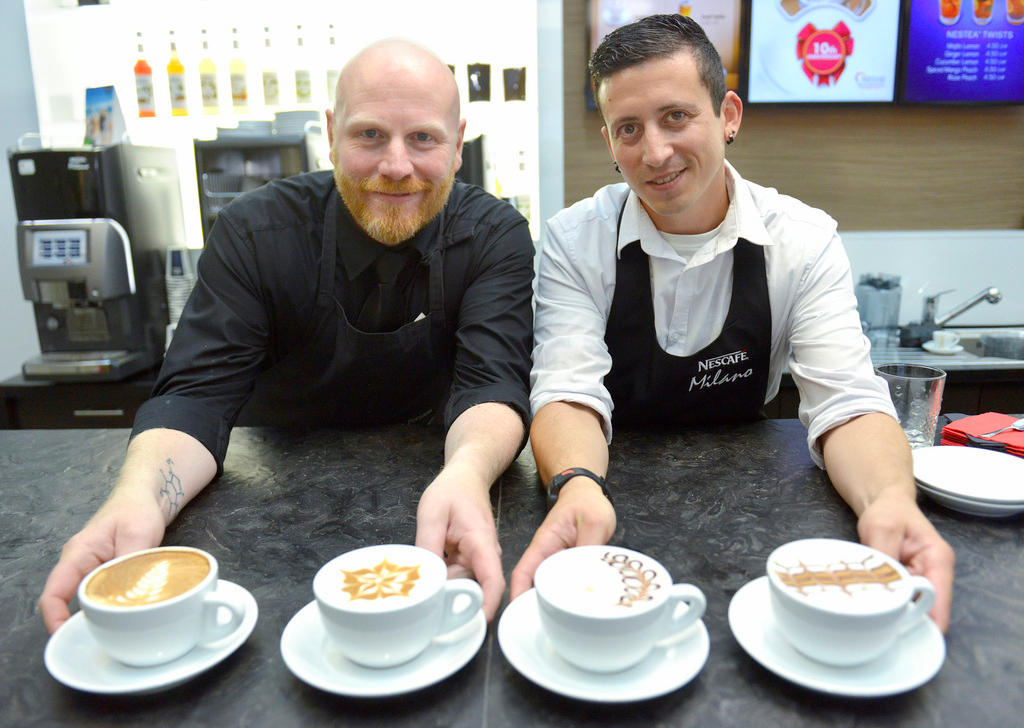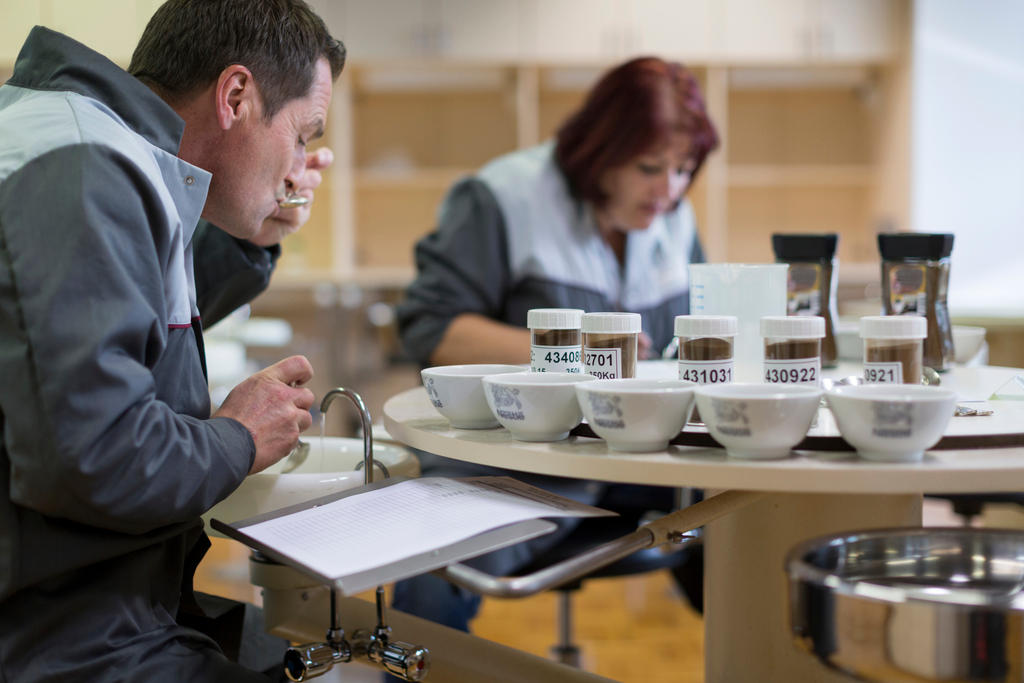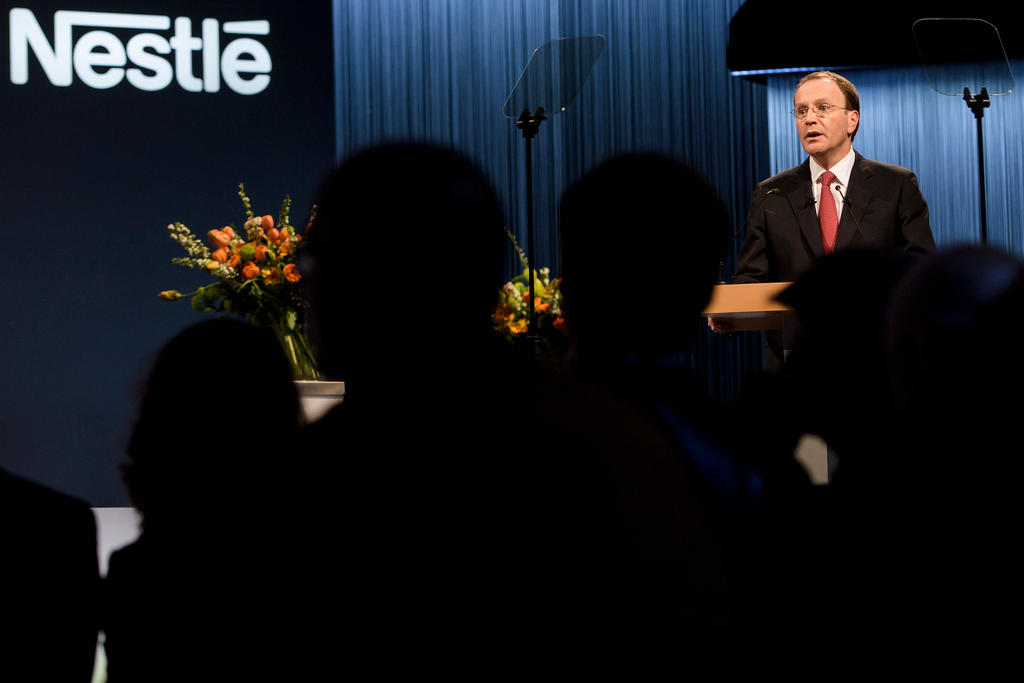Nestlé: battle for the millennial coffee drinker

A reader asked us what Nestlé’s purchase of a majority stake in Blue Bottle Coffee in 2017 means for the California company’s local employees. After a busy month for coffee drinkers with Coca-Cola’s purchaseExternal link of Costa Coffee, Starbucks’ first store in Italy,External link and comments by a Nestlé executive about the potential for Blue Bottle to work in EuropeExternal link, the future of the local, independent coffee shop is more uncertain than ever.
The quaint, local coffee shop has been a fierce battleground of globalization for decades. The disappearance of the beloved independent coffee shop pushed out by big coffee chains became a symbol of what was wrong with capitalism and free markets.
Today there is a new sort of coffee battle underway. Instead of pushing out local coffee shops, the behemoths are discreetly swallowing up smaller brands that have won fans among young, hip coffee drinkers in local urban markets.
Case in point is Nestlé, which in 2017 bought Blue Bottle Coffee – a coffee roaster and chain of shops that have attracted a cult following among discerning, millennial coffee drinkers in the California Bay Area. While the coffee company had plenty of local customers, it also amassed a devoted following with people who moved to the area to work for tech firms like Twitter and Facebook. TechcrunchExternal link called Blue Bottle “one of Silicon Valley’s favourite coffee projects”.
Nestlé paid $500 million (CHF487 million) for a 68% stake in Blue Bottle, which some experts hailed as one of the most innovative acquisitionsExternal link by a large, global company and a smart response to investor pressure to boost growth. It was also an expensive purchase – with just 40 operations this amounts to $17 million (CHF16.4 million) per shop.
Losing the local soul
When Nestlé bought a majority share of Blue Bottle, there was a major backlash in California. It was cast as a sort of doomsday for local coffee drinkers. On social media, some said the coffee company was selling its soulExternal link to a company that had a history of poor environmental practices and was facing boycotts over its water bottling practices.
But, Nestlé has so far kept Blue Bottle, well Blue Bottle. It has infused it with money but until now, there are very few reports of any major changes to the look, feel, and taste of Blue Bottle. In an interviewExternal link in New York Magazine in 2017, the company founder, James Freeman said that of “Nestlé’s 2,000 brands, they have, as far as I know, exactly one that’s a stand-alone entity with a separate board — a separate governance that’s not part of their HR system, that’s not part of their financial system. That’s us”.
Under these terms, Blue Bottle employees are not Nestlé employees to answer the reader’s question. The current management and employees retained a minority stake and continue to run the business.
This may change in the future. Just after Starbuck’s announced the opening of its first operation in Italy – the sacred home of espresso – Marco Settembri, chief executive of Nestlé for Europe, the Middle East, and north Africa commented that Blue Bottle might work in EuropeExternal link, where Nestlé already has a strong market presence. A Nestlé spokersperson told swissinfo.ch that “Blue Bottle is managed at arms length, and while they can see the opportunity for a super premium offer, Blue Bottle has no immediate plan to enter Europe”.
Hot competition
The Nestlé-Blue Bottle case is part of a wider trend toward consolidation in the fiercely competitive coffee market. In 2017, ReutersExternal link reported that since 2015 there have been nine coffee deals by Europe’s JAB Holding CoExternal link. Italy’s Massimo Zanetti also bought a majority stake in Indonesian roaster Caswells Coffee and Italy’s Lavazza bought a sizeable share in France’s Espresso Service Proximite, its third acquisition in less than two years.
In May, Nestlé also struck a $7.2 billion (CHF6.9 billion) licensing deal with Starbucks for the rights to sell the US brand’s packaged coffee outside its café chain – its third coffee acquisition in three years. Not to mention the most recent Coca-Cola purchase of the UK-based Costa CoffeeExternal link, its largest acquisition in eight years.
There are a few explanations for the scurry of acquisitions. First, there is a big markup on premium brand coffee sold in shops making it a lucrative business proposition. Second, the market is fairly fragmented and therefore, ripe territory for mergers and acquisitions.
The consumer goods industry is also facing a wider problem. As the FT reported earlier this summer, multinationals, which have dominated the consumer goods industry for decades are under threat like never before. Large multinationals failed to follow consumer behaviour trends moving away from traditional packaged foods to more locally produced, fresher options.
For Nestlé, which owns Nespresso and Nescafe, the purchase of Blue Bottle was a way to catch up with these trends by cementing its position in the rapidly growing premium brand, craft coffee business. A Nestlé spokesperson told swissinfo.ch, “we acquired a majority stake in Blue Bottle Coffee to embrace new opportunities in the super premium category and to further develop Nestlé’s coffee business”.
Additionally, while independent players such as Blue Bottle represent a small share of the coffee market, their influence may be more valuable. They are part of what has been called the third wave coffee movement focused on responsible sourcing, quality beans, and expert baristas trained in the art and science of coffee. It is estimated that top third wave playersExternal link generated just $126 million (CHF122 million) in revenue across 123 stores in 2016 compared to Starbucks’ $21.3 billion (CHF20.5 million) in revenue from 25,085 stores globally. However, they have loyal fans among millennials active on social media, an important marketing channel.
For Switzerland, this upheaval in the sector is being closely watched. The country is the fourth largest per capita coffeeExternal link consumer in the world and home to some of the largest coffee machine producers including Franke, Schaerer, and Jura. Six of the world’s main coffee traders are also based in the Lake Geneva or Zurich regions.
Thirst for growth
Do these takeovers spell the end of the independent coffee shop? Probably not. At least, in most of Europe, there are still plenty of family-owned cafés lining the streets. It may be more a matter of perspective.
While there are clear contrasts between the big multinational and the smaller start-up coffee chain, the reality is that Blue Bottle was already far beyond a corner coffee shop before Nestlé arrived. It had shops in New York, Tokyo among other cities and had already raised more than $100 million (CHF96 million) on its own.
The real question is whether the small, artisanal coffee shop will save the big multinationals.

In compliance with the JTI standards
More: SWI swissinfo.ch certified by the Journalism Trust Initiative



You can find an overview of ongoing debates with our journalists here. Please join us!
If you want to start a conversation about a topic raised in this article or want to report factual errors, email us at english@swissinfo.ch.